Hegemony fully exercised entails some act of generalization. It depends on the establishment of legitimacy. It expresses itself in the formation of a common sense.
The contemporary misreading of the history of the Marshall Plan I pointed in an earlier post is so telling precisely because it reduces a hegemonic project to an export promotion scheme.
Hegemony entails more than a quid pro quo. It is more than a bargain. In fact, one might say that private bargains depend on hegemony i.e. the establishment of some kind of more or less agreed regime of fairness and legitimacy within which to arbitrate claims and settle disputes. An export promotion scheme functions as a more or less legitimate policy of skewing flows within a global trading order. The Marshall Plan was something much more. Its aim was to restore the conditions of possibility for a global trading system to function at all. The fact that that can be denied without provoking howls of protest in Washington today is a sign of the times. To pick up the theme of this piece - it is a sign that hustle has replaced hegemony.
Of course, the operation of hegemony is always lopsided. By definition it is more to the benefit of some interests rather than others. If that were not the case, if we had actually reached a state of common collective interest, we would be talking not about hegemony but an ideal state of the world.
So hegemonic order is both an order and lopsided. It wouldn’t be hegemonic if it were not both. Corruption is a symptom of an order degenerating, in the sense that the balance between the norms and the inequality those norms protect, is upset. The norms are either too grotesquely self-serving or they are not observed at all. The self-dealing of insiders is too overt.
That America likes to celebrate itself as a meritocracy whilst sociology rigs the game in favor of the top 1 percent, is not, in this sense, surprising. Nor is it surprising that a variety of mechanisms conspire to reproduce those advantages across generations. The fact that the Clinton and Bush’s established political dynasties was borderline legitimate. They functioned, just about, within the bounds of those mechanisms that we agree are “normal” sociology, rather than corruption. As far as the Clinton’s were concerned the Republican side lost the faith. On the part of Democrats, legitimacy collapsed in 2016 with the election of Donald Trump. Trump and his clan have been dogged by accusations of corruption.
Now, to repeat this is not in itself surprising. It is common place for members of the political and business elites to favor themselves and their immediate families. It is common place also for accusations of corruption to be made in a super-heated political arena. But, in the US context, the overtness with which this happened and continues to happen around Trump is new. What is less often noted, but no less surprising, are the small stakes for which the Trumps seemingly play. And yet it is these three facts together that really characterize our current moment: the overtness of the conflicts of interest; the small stakes; and the scale of the outcry.
The bar for kleptocracy in the modern world is set high. Corruption on the part of heads of state and big corporations is commonly a billion-dollar business. Transparency International’s list of the top 25 global corruption cases includes: Siemens $1.4 bn; Sani Abacha Nigerian $3-4 bn; Fujimori Peru $600m; Ben Ali Tunisia $13 bn; Yanukovych and Co Ukraine $40 bn; 1MBD Malaysia $4bn; Russian Laundromat - Molodovan connection $20-80 bn etc etc etc
By comparison with corruption on this kind of historic scale, the striking thing about the self-dealing of the Trump clan is that it is both very overt and remarkably petty.
Cameron Abadi and I get into the details on the podcast this week:
The US economy is the biggest in the world. The monopolistic profits that can be generated are huge. The US government is capable of delivering gigantic subsidies through entirely legitimate channels. If you are running a truly big business, one that is too big to fail, you can be on the receiving end of billions of dollars of pubic money with minimal accountability. One is put in mind of Bertolt Brecht’s great line: “What is the burgling of a bank to the founding of a bank?”
The fact of the matter is that the Trump clan operates on too small a scale and in too marginal enterprises to truly take advantage of the opportunities at their disposal. To generate billions in earnings you need to be in a scaleable business, in a business like commodities or finance. With the exception of Truth Social, Trump’s businesses in real estate, resorts and golf clubs are too lumpy and to tied to discreet real assets to serve as the vehicles for anything more than relatively small side payments.
The sobering fact is that the office of the Presidency in the United States, the world’s richest country, and the leadership of one of its two leading parties, the GOP, has been put in the service of a medium-sized clan enterprise. And, more to the point, despite the liberal uproar his malfeasances provoke, it is also pretty evident that truly maximizing profit is neither Trump’s main talent nor his main purpose.
To get a handle on this phenomenon it is very clarifying to start with a recent breakdown of Trump’s wealth provided by Forbes. According to the Forbes data, Trump has a net worth, allowing for $600 m in legal liabilities, of roughly $ 3.9 billion.
Source: Forbes
Of the $3.9 billion, $ 2 billion are his core holdings of real estate, resort and club properties. This is a very substantial basis of wealth by any standard.
On the real estate deals there are sweetheart loans here or there, no doubt. The main chance for side-payments and influence peddling would seem to come in the sale of condos to dubious purchasers who pay over the odds either to preserve anonymity or to buy favor. Ten million dollars here. Ten million there.
This would be a typical entry in the Forbes list:
The clubs are the most profitable part of the Trump empire. And they benefit handsomely from Trump’s celebrity. Mar-a-Lago is running at full steam. Thanks to the painstaking investigations of the New York Times we know an excruciating amount about the resorts catering operations, the price of banquets and drinks bills footed by the US government.
Note that the big bubbles in this impressive graph are a few hundred thousand dollars each in payments for a banquet or social occasion. The price, in short, of a substantial society wedding. Trump clearly loves Mar-a-Lago and is no doubt pleased with the business. But can anyone take this kind of petty, mafia underboss stuff seriously, as an account of what makes the man tick?
Trump’s overseas interests are minor. His golf courses in Europe lose money. He would do well to sell them to cover his outstanding legal bills.
The truly mind-boggling bit of Trump’s portfolio is Truth Social. This is an extraordinary phenomenon. Notionally it is an anti-woke social media platform designed to give Trump an alternative to Facebook, Twitter etc. De facto it has virtually no users, no revenue to speak of and so it makes large losses. In 2023, Trump Media brought in just $4.1 million in revenue. Of that Truth Social generated $3.4 million in the 12 months through June. The whole outfit recorded a net loss of $380 million.
Now it is no unusual for start ups to burn money. But the disproportion in this case between revenue and outlay is grotesque. Even more outlandish is the valuation of Trump’s media money-pit. This autumn, on the basis of the prevailing share price, Trump’s holding in Trump Media and Technology Group was valued by Forbes at $1.8 billion, down from $6 billion at its peak.
Other than providing a paltform for Trump advertising spots seen by a tiny audience, Trump Media & Technology Group also sells silver coins, Bibles, gold hightop sneakers, digital trading cards and diamond-encrusted watches, all branded with Trump’s name and campaign slogans.
You would be tempted to describe this as a con, were it not for the fact that everyone participating is in the know. Investors are choosing either to speculate on the Trump brand or are willingly staking their money to gratuitously confer wealth on him. There is no immediate qui pro quo though no doubt major investors gain goodwill with Trump. As Politico reports:
And while Trump is not a director or executive at the company, the board is stacked with some of his closest advisers, including his son, Don Jr.; Robert Lighthizer, the former U.S. trade representative; and onetime SBA Administrator Linda McMahon, who is also heading up the Trump transition alongside Wall Street veteran Howard Lutnick.
The share price of the Trump Media and Technology group fluctuates with Trump’s legal and political fortunes. The recent slide in price began in May 2024 with his conviction on 34 felony counts. If Trump were to win in November, one should presumably expect the price to rocket.
Source: CNN
Clearly this is a highly dubious construction and ripe for use as a mechanism for influence. It is the piece of Trump’s personal portfolio that offers the chance for truly large-scale corruption. But it operates in full view and has more to do with “meme stocks” than multinational oil trading schemes or large-scale skimming from public procurement.
Then there is Trump’s recent enthusiasm for crypto, which I wrote about previously on the newsletter. As recently as 2021, Mr. Trump was no fan. Crypto, he declared, “seems like a scam.” Now he champions a business whose mission is to”make crypto and America great by driving the mass adoption of stablecoins and decentralised finance”. Trump’s new line is that: “We’re embracing the future with crypto and leaving the slow and outdated big banks behind”. The new enthusiasm has been inspired in part by the influence of his now 18-year old son Barron, who is a dorm-room crypto enthusiast. Barron, Trump has told journalists, “talks about his wallet — He’s got four wallets or something,” ‘What is a wallet? Explain this to me’. “It’s almost like younger people know it a lot better than older people,”
As the details emerge of Trump’s engagement with World Liberty Financial it becomes all the stranger. It is a business cooked up by a couple of unsavory hucksters with no standing in the crypto world that seems to be based on a close tie to dollar-linked stable coins. What attracts Trump other than the promise of applause and donations is the license to create money that crypto evoked. To embarrassed laughs from his audiences he has taken to joking about the idea of creating $35 trillion worth in crypto with which to pay the American national debt.
“Maybe we’ll pay off the $35 trillion in crypto,” he said. “How do you like that? I’ll write on a little piece of paper, ‘$35 trillion crypto’ — we have no debt. Right? That’s what I like.”
It is hard to know whether the laughter this evokes is down to the fact that the idea is silly. Or whether people laugh because Trump’s remark exposes the conventional character of the fiat money system, which was precisely what bitcoin was supposed to guard against. In any case, crypto as grifter fiat money is right up Trump’s street.
How much wealth could this generate for Trump and his clan? Were Trump to be elected, he would, as President be in a position to manipulate crypto regulation to the benefit of World Liberty Financial and more serious crypto outfits. Conceivably, it could be another Truth Social in the making. But, if that was the plan, why choose an insignificant and disreputable outfit like World Liberty Financial as your partner, as opposed to the big-name outfits that would be only too happy to receive Trump’s favor?
None of this suggests that Trump is designing his businesses as vehicles for influence-peddling. He has been perfectly open to all kinds of lobbying, of course. Back in May, he offered America’s oil barons a deal for one billion in campaign contributions. But that is policy. Across Trump’s businesses, the common denominator is not the deliberate pursuit of profit through influence peddling, but an idiosyncratic and erratic form of personal brand marketing.
What about Jared Kushner and Ivanka who played such an important part in the Trump Presidency?
Jared Kushner’s $3 billion private equity fund known as Affinity Partners has attracted attention from the Senate Finance Committee. Kushner’s sudden switch from real estate development to private equity would seem to fit squarely into the model of influence-peddling and kick backs. Whilst Trump was in office Kushner pursued a policy in the Middle East that was closely allied to the Gulf States. Now 99 percent of the roughly $3 billion invested in his fund has come from overseas sources, including $2 billion from the Saudi government’s Public Investment Fund. Most of the rest came from the sovereign wealth funds of Qatar and the United Arab Emirates was well as a slice from Terry Gou, the Taiwanese billionaire and founder of Foxconn. There is also a fifth “mystery foreign investor Affinity has declined to identify”.
The really striking thing about the fund in its early days, apart from the source of its cash, was Kushner’s lack of experience in the sector, which prompted a Saudi investigation into the suitability of Affinity as a partner. The Board of the Saudi Public Investment Fund, led by Crown Prince Mohammed bin Salman, overruled those objections.
Perhaps unsurprisingly given the lack of prior experience it has taken time for Affinity to actually start making investments. As a result, since 2021 it has so far mainly served as a vehicle for paying Kushner and his team somewhere between $112 and $150 million in fees. This kind of fee structure is not unusual in private equity. In exchange, a normal fund is expected to make handsome profit payouts within five to six years. After its slow start, Affinity has begun to make a range of investments. None of those are on the face of it unusual. They include the usual range of smaller and mid-market businesses favored by private equity: “an Israeli car-leasing and financing company; a Dubai-based online real estate site; … a Munich-based electronic fitness company; Mosaic, a California-based solar lending site; and Zamp, an Abu Dhabi-backed fast food company that operates more than 1,000 restaurants in Brazil.” It will be surprising, to say the least, if Affinity can make large profit payouts soon. It would be even more surprising, however, if Kushner’s friends in the Gulf pressed him too hard.
Affinity is also involved in hotel and resort development projects in Serbia and Albania, where Kushner and Ivanka Trump are dealing directly with the national governments. Predictably, the $1 billion project that the pair are pursuing in Albania has run into local objections over land rights. Along with the government, Mr. Kushner has turned to one of Albania’s richest families — headed by Shefqet Kastrati, a billionaire real-estate developer and owner of Albania’s largest chain of gas stations — to make the deal happen. The Kastrati Group has longstanding ties to Mr. Rama, Albania’s prime minister and is involved in several key public-private partnerships, including the airport in Tirana. But, one is tempted to ask, how else would anyone expect a large-scale foreign hotel investment, backed by Gulf money and fronted by the Trumps to be done? Of course, Albania’s oligarchs and the government roll out the red carpet. Such networking is ubiquitous. If there is anything striking about the deal it is the hip choice of location. Someone in the Trump-Kushner team knows a thing or two about tourist trends.
And in the final analysis, the surprising thing is that everyone in the Trump clan seems to be hustling. Why do they do it? Are they bored? Do they need to prove themselves? Are they worried about not getting their share?
By any reasonable standard they are rich. There are close to $2 billion in solid-looking assets in the Forbes listing of Trump’s assets. Even if you knock that back to allow for fluctuations in Trump’s brand, you are well over $1.5 billion. There is no shortage of money in this family. And yet the hustle goes on, the network is put to work, not for billions, but for a slice of a hundred million here or there, a condo for ten million etc etc. And Trump’s opponents, rather than shrugging, transpose all this minor activity into opprobrious talk of grand corruption, as though major national assets were at stake. The entire triad - overt networking, minor payments and relentless outrage - is symptomatic of our moment. The casualty, is the kind of self-confident sharing of a legitimate order of privilege and hierarchy that defines an actually existing hegemony.
I love writing Chartbook. I am delighted that it goes out for free to tens of thousands of readers around the world. In an exciting new initiative we have launched a Chinese edition of Chartbook. What supports this activity are the generous donations of active subscribers. Click the button below to see the standard subscription rates. I keep them as low as substack allows, to ensure that supporting Chartbook costs no more than a single cup of Starbucks per month. If you can swing it, your support would be much appreciated.

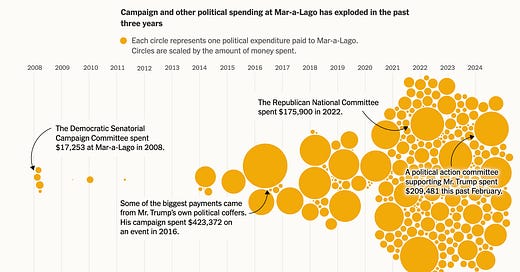


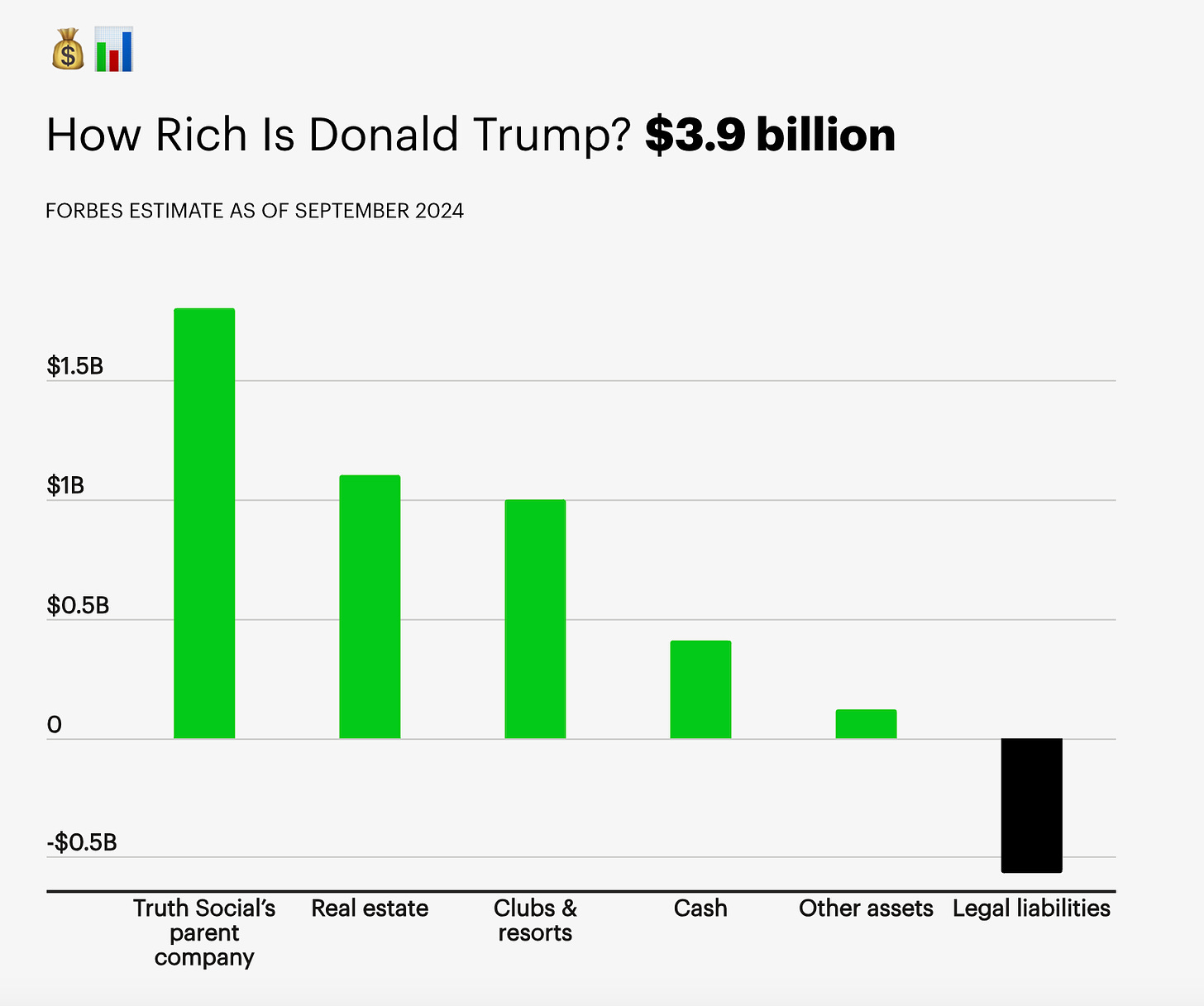
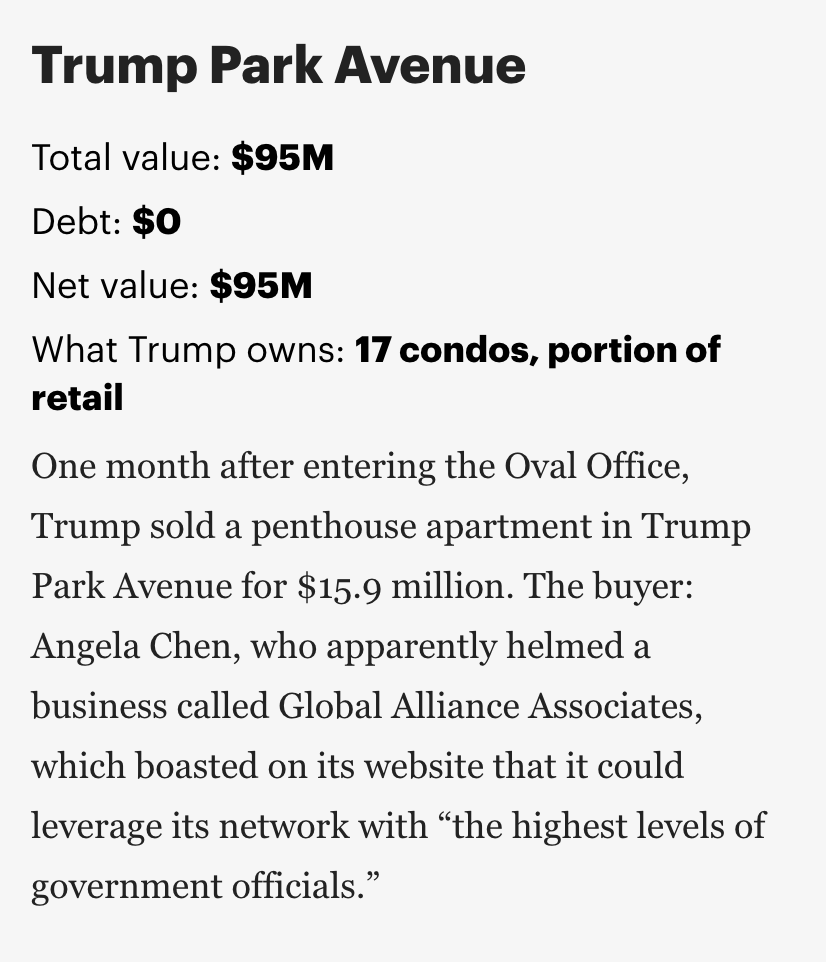
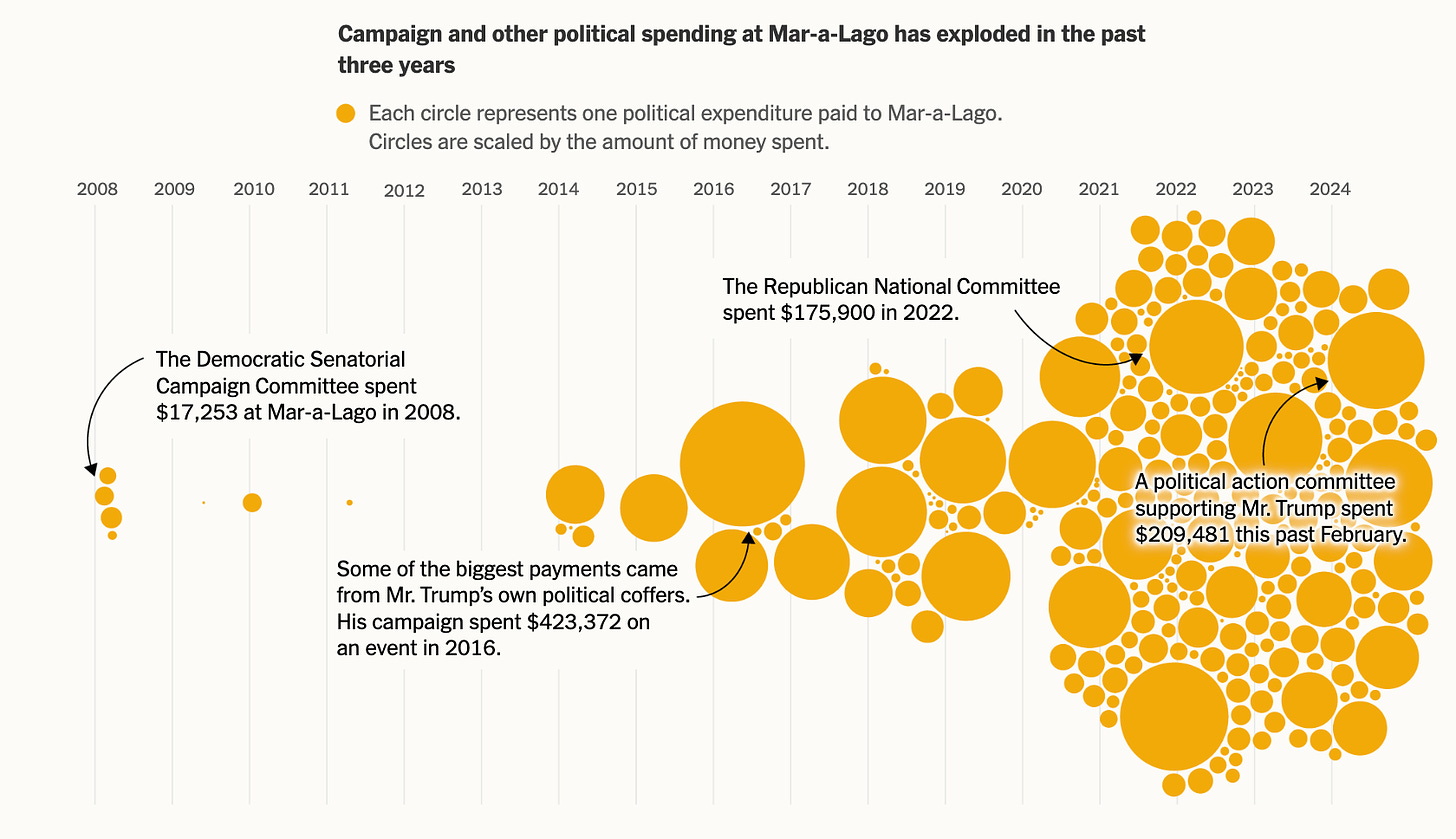
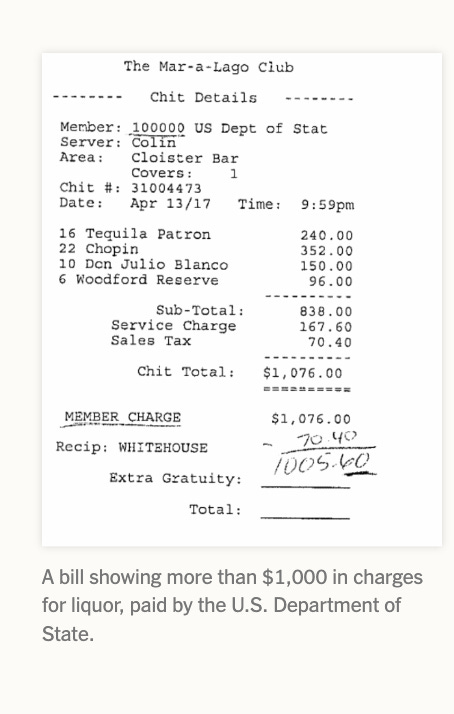
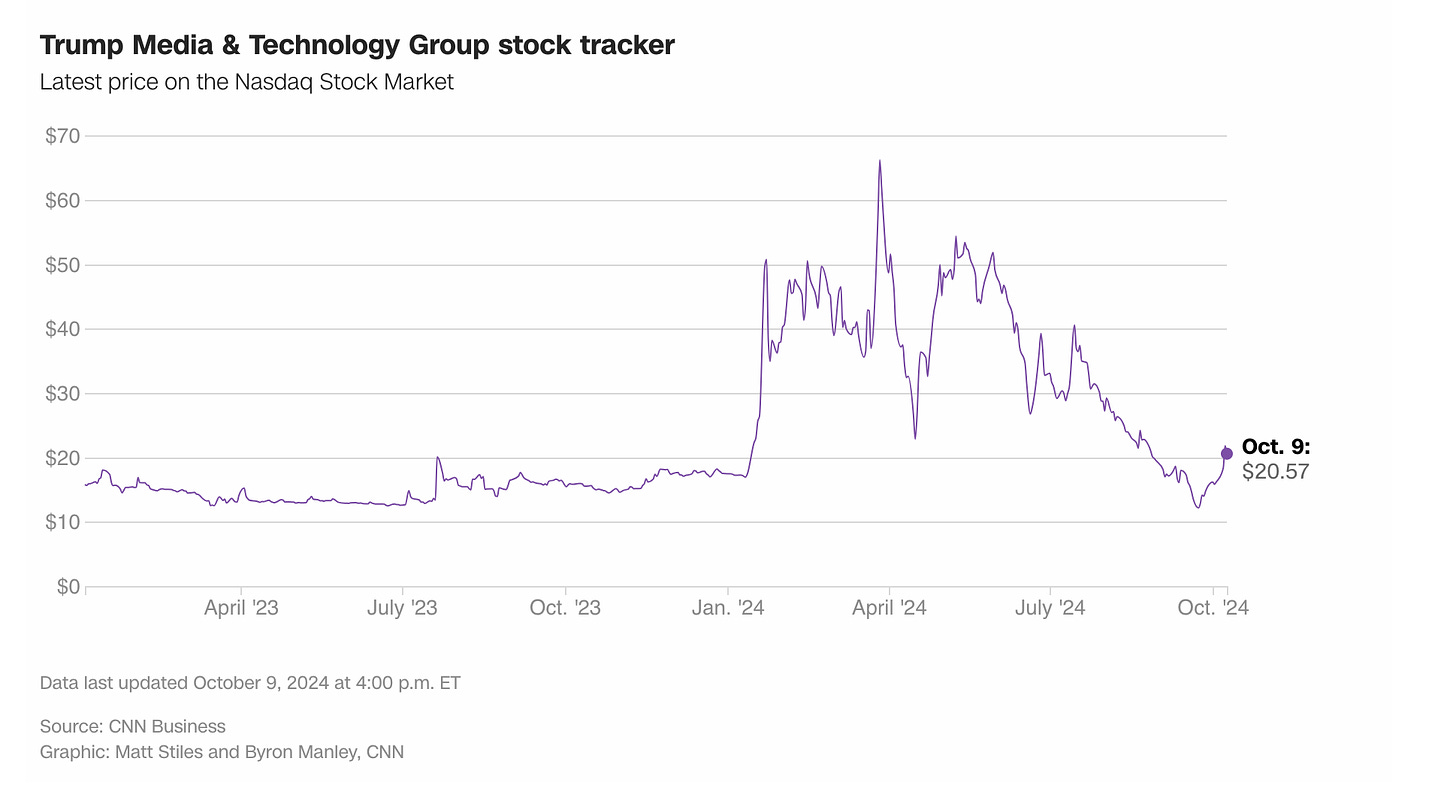
The fact that Trump is corrupt for (relatively) small sums tells us lots about his personality but hardly proves that he's not corrupt. Moreover, if you're treating "corruption" as relative, then "relative to other US presidents and politicians" Trump's corruption is shocking.
We have a "credit" money system. If someone pays off the US debt, the way Michael Tucker saves Mickey Rourke's life by picking up his bad gambling debts in "Diner," that person would own all of the outstanding Treasury obligations. (Tucker expected to recoup his money by putting Rourke to work for him.) Those obligations are assets. The buyer would be just as rich as he was before buying the debt. What if the buyer simply burned all those purchased Treasuries? That's absurd. The private sector would have that much LESS wealth--or even a cascade of shrinking wealth if those Treasuries were collateral for other loans. The idea that U.S. taxpayers drag around a millstone called "the debt"--the way an individual is weighed down by a giant credit card balance--and that we'd all be economically healthier if we paid it off--is not accurate. A person who buys a Treasury bond with dollars is not a penny less wealthy for buying the bond. She's just a shade less liquid. The Chinese buy Treasuries with dollars we paid them for goods; i.e., they traded those dollars for our interest-bearing, risk-free liabilities. The US has a very big, two-sided balance sheet. Shrinking it (deleveraging) would make the economy smaller. We're divided partly because people believe that the government confiscates taxes from one person and gives the money to someone less deserving. That's a fallacy. The government issues debt and dollars simultaneously. This double-entry system allows dollars to be spent (or loaned by banks) into existence, and taxed or repaid out of existence. The question that CNN and CBS love to ask Democrats--"Where will you get the money to pay for that?"--shows their mistaken belief that the government is like a person, vis-a-vis money, and that dollars, like matter, can't be created or destroyed. When your IOUs are universally accepted as money, as Uncle Sam's are, you have ipso facto uncapped spending power (which nonetheless must have a sinking fund, financed with tax revenue, or it loses credibility). That's how we fight chronic wars, bail out too-big-to-fail banks, and finance hurricane recovery with such magical fluidity. For better or worse, that's the secret of our country's wealth and power. Alexander Hamilton set it up that way. As for Trump, his wealth may be bounded but his danger to the country isn't.